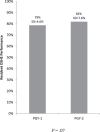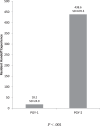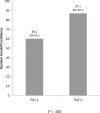Internal medicine postgraduate training and assessment of patient handoff skills
- PMID: 24404301
- PMCID: PMC3771167
- DOI: 10.4300/JGME-D-12-00203.1
Internal medicine postgraduate training and assessment of patient handoff skills
Abstract
Background: Effective communication during patient care transitions is essential for high-quality patient care.
Objective: The purpose of this study was (1) to objectively assess patient handoff skills of internal medicine residents, and (2) to evaluate correlations between clinical experience and patient handoff skill self-assessment with directly observed skill.
Methods: We studied simulated patient handoffs in postgraduate year (PGY)-1 and PGY-2 residents between July 2011 and September 2011, using a standardized scenario in an observed structured handoff exam (OSHE). Our design was a posttest-only, with nonequivalent groups. Assessment used a previously published checklist for evaluating handoff skills. Residents were asked about clinical experience with patient handoffs and about their self-confidence in performing a patient handoff independently. We evaluated between-group differences on OSHE checklist performance, patient handoff experience, and self-confidence and used multiple regression analyses to assess the association between performance, experience, and confidence.
Results: Forty-seven PGY-1 residents and 38 PGY-2 residents completed the study. Interrater reliability was substantial (intraclass correlation = 0.68). There was no significant difference in OSHE performance by PGY-1 residents (mean = 79%, SD = 4.6) and PGY-2 residents (mean = 82%; SD = 7.6; P = .07). The PGY-2 residents were significantly more experienced (P < .001) and confident (P < .001) than PGY-1 residents were, yet clinical experience and self-confidence did not significantly predict OSHE performance.
Conclusions: Clinical experience and self-assessment do not predict skills in simulated patient handoffs, and residents with substantial clinical experience still benefit from further skills development.
Figures



Similar articles
-
Using a Direct Observation Tool (TOC-CEX) to Standardize Transitions of Care by Residents at a Community Hospital.Ochsner J. 2021 Winter;21(4):381-386. doi: 10.31486/toj.20.0154. Ochsner J. 2021. PMID: 34984053 Free PMC article.
-
The Modified, Multi-patient Observed Simulated Handoff Experience (M-OSHE): Assessment and Feedback for Entering Residents on Handoff Performance.J Gen Intern Med. 2016 Apr;31(4):438-41. doi: 10.1007/s11606-016-3591-8. Epub 2016 Jan 29. J Gen Intern Med. 2016. PMID: 26831306 Free PMC article.
-
Predicting and communicating risk of clinical deterioration: an observational cohort study of internal medicine residents.J Gen Intern Med. 2015 Apr;30(4):448-53. doi: 10.1007/s11606-014-3114-4. Epub 2014 Dec 2. J Gen Intern Med. 2015. PMID: 25451991 Free PMC article.
-
Resident Training and the Assessment of Orthopaedic Surgical Skills.JB JS Open Access. 2021 Dec 23;6(4):e20.00173. doi: 10.2106/JBJS.OA.20.00173. eCollection 2021 Oct-Dec. JB JS Open Access. 2021. PMID: 34964000 Free PMC article. Review.
-
Using the ACGME Milestones for Resident Self-Evaluation and Faculty Engagement.J Surg Educ. 2016 Nov-Dec;73(6):e150-e157. doi: 10.1016/j.jsurg.2016.09.001. J Surg Educ. 2016. PMID: 27886973 Review.
Cited by
-
Using a Direct Observation Tool (TOC-CEX) to Standardize Transitions of Care by Residents at a Community Hospital.Ochsner J. 2021 Winter;21(4):381-386. doi: 10.31486/toj.20.0154. Ochsner J. 2021. PMID: 34984053 Free PMC article.
-
Treatment of status epilepticus in pediatrics: curriculum learning combined with in-situ simulations.BMC Med Educ. 2022 Jul 19;22(1):557. doi: 10.1186/s12909-022-03626-x. BMC Med Educ. 2022. PMID: 35850766 Free PMC article.
-
Improving Handoffs: Implementing a Training Program for Incoming Internal Medicine Residents.J Grad Med Educ. 2018 Dec;10(6):698-701. doi: 10.4300/JGME-D-18-00244.1. J Grad Med Educ. 2018. PMID: 30619532 Free PMC article.
-
The Modified, Multi-patient Observed Simulated Handoff Experience (M-OSHE): Assessment and Feedback for Entering Residents on Handoff Performance.J Gen Intern Med. 2016 Apr;31(4):438-41. doi: 10.1007/s11606-016-3591-8. Epub 2016 Jan 29. J Gen Intern Med. 2016. PMID: 26831306 Free PMC article.
-
Virtual Adaptation of Resident I-PASS Training Session During COVID-19.Kans J Med. 2022 Jun 20;15(2):215-217. doi: 10.17161/kjm.vol15.17025. eCollection 2022. Kans J Med. 2022. PMID: 35762005 Free PMC article.
References
-
- Accreditation Program: Hospital national patient safety goals. 2008. The Joint Commission. http://www.patientsafety.gov/TIPS/Docs/TIPS_JanFeb08.pdf. Accessed July 17, 2012.
-
- Institute of Medicine. Resident Duty Hours: Enhancing Sleep, Supervision and Safety. Washington, DC: National Academies Press; 2009. - PubMed
-
- Sutcliffe KM, Lewton E, Rosenthal MM. Communication failures: an insidious contributor to medical mishaps. Acad Med. 2004;79(2):186–194. - PubMed
-
- Accreditation Council for Graduate Medical Education. Common Program Requirements, 2011. http://www.acgme.org/acgmeweb/Portals/0/dh_dutyhoursCommonPR07012007.pdf. Accessed March 7, 2013.
LinkOut - more resources
Full Text Sources
Other Literature Sources
